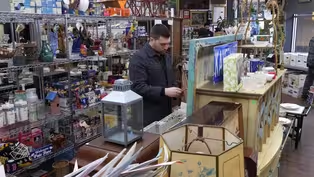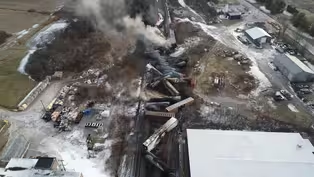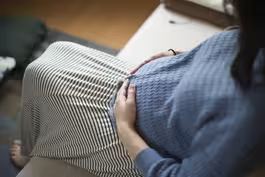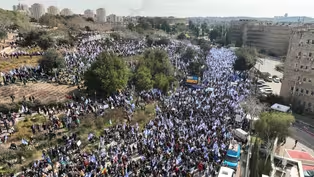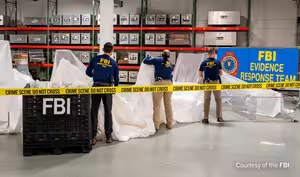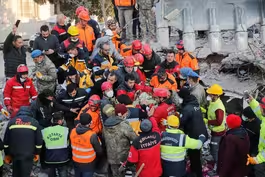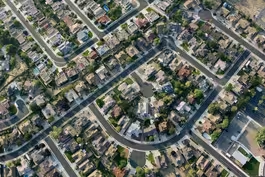
Rebel-held areas of Syria left without earthquake aid
Clip: 2/13/2023 | 7m 16sVideo has Closed Captions
Earthquake victims in rebel-held area of Syria left without aid, rescue operations
In Syria, the earthquake brutalized a community that has already suffered more than a decade of war. Rebel-held provinces in the country's northwest now face a double disaster: the deadly quake and little to no outside help. Special correspondent Jane Ferguson and video journalist Jorgen Samso traveled to Afrin in Syria's Aleppo province where they found heartache but also stories of resilience.
Problems playing video? | Closed Captioning Feedback
Problems playing video? | Closed Captioning Feedback
Major corporate funding for the PBS News Hour is provided by BDO, BNSF, Consumer Cellular, American Cruise Lines, and Raymond James. Funding for the PBS NewsHour Weekend is provided by...

Rebel-held areas of Syria left without earthquake aid
Clip: 2/13/2023 | 7m 16sVideo has Closed Captions
In Syria, the earthquake brutalized a community that has already suffered more than a decade of war. Rebel-held provinces in the country's northwest now face a double disaster: the deadly quake and little to no outside help. Special correspondent Jane Ferguson and video journalist Jorgen Samso traveled to Afrin in Syria's Aleppo province where they found heartache but also stories of resilience.
Problems playing video? | Closed Captioning Feedback
How to Watch PBS News Hour
PBS News Hour is available to stream on pbs.org and the free PBS App, available on iPhone, Apple TV, Android TV, Android smartphones, Amazon Fire TV, Amazon Fire Tablet, Roku, Samsung Smart TV, and Vizio.
Providing Support for PBS.org
Learn Moreabout PBS online sponsorshipAMNA NAWAZ: Let's take a deeper look now at the aftermath of the earthquake.
In Syria, it brutalized a community that's already suffered more than a decade of war.
Rebel-held provinces in the country's northwest now face a double disaster, the deadly quake and little to no outside help.
Special correspondent Jane Ferguson and video journalist Jorgen Samso traveled over the weekend to the city of Afrin in Syria's northwest Aleppo province.
There, they found death and heartache, but also stories of survival and resilience.
JANE FERGUSON: One week since the earth shook lives apart here, and no one came to help.
In Northwest Syria, they are not going to come, no international rescue operations, no search dogs, no paramedics.
People in this rebel-held enclave watched their loved ones struggle and die slowly under the rubble in the hellish days since the earthquake.
When we reached the town of Jindires in Aleppo province, they were pleading for their message to reach the outside world.
MAN: Don't help us, all the world.
Here, we are people.
We are human.
We are -- we need life.
JANE FERGUSON: The local volunteer group the White Helmets, once nominated for a Nobel Peace Prize for saving thousands from airstrikes, did what they could to pull people from the rubble.
But their diggers and rudimentary tools struggled against this new and massive natural disaster.
When the earthquake struck here, people's only source of help was the White Helmets.
They have been pulling people out of the rubble due to Russian airstrikes and attacks by the Assad regime for years.
But they only have a certain amount of equipment.
And now, almost a week after the earthquake, they themselves have not received any additional help.
Our visit to Northwest Syria was a rare opportunity to access the area, a place where five million have fled to escape the wrath of Syrian dictator Bashar al-Assad.
The Turkish government tightly controls its border with this area.
Rebels here, many of them extremist Islamist fighters, have an agreement to cooperate with the Turkish authorities.
But that has not helped get aid in this past week.
The contrast to Turkey, where well-equipped rescue teams from all over the world have search for people under the rubble, is glaring.
A manmade border decides between life and death.
SALAHUDDIN HAWA, Earthquake Survivor: Our young children who are under the rubble are imploring people to take them out of the rubble.
And the international community is saying that, for political reasons, we cannot send aid to you.
Is this reasonable?
Is this a world that can be lived in?
JANE FERGUSON: Salahuddin Hawa taught comparative literature at Aleppo University before the war.
He and his wife and six children all survived the earthquake, but they have been forced to sleep elsewhere in case, as their home is not safe.
The "NewsHour" first met him outside Aleppo over 10 years ago, as the resistance to Assad was at its height.
SALAHUDDIN HAWA: But, when you talk about an earthquake, a violent earthquake, the politics is intermingled with humanitarian - - with a humanitarian crisis.
You cannot take politics away from our life, because we are here because of politics.
We are here.
We have been displaced of our houses, of our cities because we were political activists, only because we said no to Bashar al-Assad.
JANE FERGUSON: The politics of who gets what help has never been more stark.
Syrian regime areas have received aid trucks from the U.N., and rebel-held areas are getting some of the usual food and medical supplies.
But there has been no additional assistance, and no disaster response units.
SALAHUDDIN HAWA: Imagine that this earthquake happened in anywhere around the world.
What would the situation be?
Can you say that we will not send, for example, aid because that country is a communist or a capitalist or whatever?
No, we do not do that.
JANE FERGUSON: This place has been pounded by Syrian government forces and their Russian allies for years.
Many of the buildings were made poorly by the displaced and weakened by the constant military bombardment, making them all the more vulnerable.
And so people's homes became death traps, entire families gone, like little Mohammed Mohammed's.
The 7-year-old now lays in the Afrin public hospital after his home collapsed; 10 perished, including his parents and all of his siblings.
He spent three days under the rubble next to them before being pulled out alive.
Jasmine Marjan is a distant relative, and now all he has in the world.
She shows us pictures of his family.
No one survived, she tells me, only Mohammed.
He has had an operation on his leg already.
He has a broken hand.
But, beyond that, the lack of wounds is really remarkable after three days under the rubble.
Children have been orphaned at a cruel rate in Syria's war for nearly 12 years.
Babies like Aya now join their ranks.
When the White Helmets pulled her freezing, bruised body from the wreckage, videos of her were beamed around the world.
Her mother had given birth in the rubble, dying.
We visited Aya in another hospital in Afrin town.
She has recovered, is thriving, and beautiful.
Aya has come to embody Syria's pain and survival, the impossible endurance of this place the world forgot.
The doctor who treated her when she came in, Hani Maroof, is still overwhelmed when he speaks about her.
How do you explain her survival?
DR. HANI MAROOF, Syria: It's a miracle.
her story is a short video of our story.
We have 12 years of fighting, like her.
JANE FERGUSON: Those like him have been fighting to keep Syrians alive for years, under impossible conditions.
DR. HANI MAROOF: The man who take it from her under the rubble held her like this.
Why?
Why he don't hold her like this?
It is that simple.
We will still fight.
JANE FERGUSON: Much of that fight now is for survival, more families forced to survive out in the open, sleeping in tents until they can somehow recreate the homes they once built from lives already ruined by war.
For the "PBS NewsHour," I am Jane Ferguson in Afrin, Syria.
Museum of Lost Memories helps connect mementos with owners
Video has Closed Captions
Clip: 2/13/2023 | 6m 52s | Museum of Lost Memories helps reunite misplaced family mementos with their owners (6m 52s)
Release of toxic chemicals prompts broader safety concerns
Video has Closed Captions
Clip: 2/13/2023 | 7m 11s | Release of toxic chemicals from train derailment in Ohio prompts broader safety concerns (7m 11s)
Sharp rise in deaths among pregnant women and new mothers
Video has Closed Captions
Clip: 2/13/2023 | 5m 14s | What's behind a sharp rise in deaths among pregnant women and new mothers? (5m 14s)
Thousands protest Israeli plan to weaken nation's judiciary
Video has Closed Captions
Clip: 2/13/2023 | 7m 38s | Thousands in Israel protest far-right government's plan to weaken nation's judiciary (7m 38s)
U.S. reveals new details about flying objects
Video has Closed Captions
Clip: 2/13/2023 | 5m 36s | U.S. reveals new details about flying objects and decision to shoot them down (5m 36s)
Victims found alive in rubble a week after earthquake
Video has Closed Captions
Clip: 2/13/2023 | 2m 52s | Victims found alive in rubble a week after earthquake that killed 37,000 in Turkey, Syria (2m 52s)
White House outlines plan to address soaring rent prices
Video has Closed Captions
Clip: 2/13/2023 | 6m 13s | White House outlines plan to address nation's soaring rent prices and protect tenants (6m 13s)
Providing Support for PBS.org
Learn Moreabout PBS online sponsorship
- News and Public Affairs

FRONTLINE is investigative journalism that questions, explains and changes our world.

- News and Public Affairs

Amanpour and Company features conversations with leaders and decision makers.












Support for PBS provided by:
Major corporate funding for the PBS News Hour is provided by BDO, BNSF, Consumer Cellular, American Cruise Lines, and Raymond James. Funding for the PBS NewsHour Weekend is provided by...
